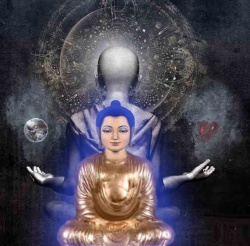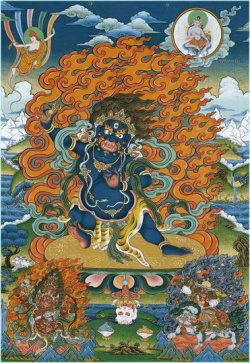Difference between revisions of "The Immeasurables and Bodhicitta"
(Created page with " The Immeasurables and Bodhicitta The reason why I have chosen to speak on the four immeasurables and the generation of bodhicitta is that they are th...") |
|||
| (2 intermediate revisions by the same user not shown) | |||
| Line 1: | Line 1: | ||
| + | <nomobile>{{DisplayImages|4299|507|1210|1846|2931|2692}}</nomobile> | ||
| + | The [[Immeasurables]] and [[Bodhicitta]] | ||
| + | |||
| + | The [[reason]] why I have chosen to speak on the [[four immeasurables]] and the generation of [[bodhicitta]] is that they are the [[essence of Buddhahood]]. If we wish to attain [[Buddhahood]] the only way is to generate its [[cause]], [[bodhicitta]]. | ||
| + | |||
| + | [[Bodhicitta]] can be divided into two kinds: aspirational [[bodhicitta]], which is the {{Wiki|sincere}} wish to establish all [[beings]] in [[enlightenment]], and [[activity]] [[bodhicitta]], which caries this out. | ||
| + | |||
| + | |||
| + | |||
| + | It can also be divided into two as [[Wikipedia:Convention (norm)|conventional]] [[bodhicitta]], which a [[dualistic]], and [[Wikipedia:Absolute (philosophy)|ultimate]] [[bodhicitta]], which is a [[non-dualistic mind]] looking at itself, resting in a [[state]] free of [[thought]]. In that [[state]] our [[mind]] and the [[Buddha's]] [[mind]] are the same. | ||
| + | |||
| + | If we can sustain this, our [[mind]] is not different than [[Buddha's]]. | ||
| + | |||
| + | With [[Wikipedia:Convention (norm)|conventional]] [[bodhicitta]] we wish to {{Wiki|liberate}} all [[beings]] and with [[Wikipedia:Absolute (philosophy)|ultimate]] [[bodhicitta]] we dissolve even that, and rest in [[thought]] free [[awareness]]. | ||
| + | |||
| + | The [[teaching]] on [[bodhicitta]] is the same in all [[lineages]] of [[Mahayana Buddhism]]. | ||
| + | |||
| + | |||
| + | |||
| + | Even though we have received the [[teaching]] on [[bodhicitta]], we have a hard time applying it when difficulties arise. When we sit in a comfortable room after having eaten a good meal it's easy to give rise to [[bodhicitta]]. | ||
| + | |||
| + | But with the problems of daily [[life]] it's easy for [[bodhicitta]] to go out the window. | ||
| + | |||
| + | So I've chosen to speak on it tonight. These [[prayers]] I have translated are [[traditionally]] practiced as part of the [[ngondro]] for the fivefold [[mahamudra]]. | ||
| + | |||
| + | These practices are not something to be set aside after you do them, though, they are to be continued to be practiced. To start, try to remember the [[person]] for whom you've had the greatest [[love]] and {{Wiki|affection}}. | ||
| + | |||
| + | When we [[feel]] that [[love]], our normal [[egotism]] is set aside. There is nothing that we would like to do more than remove their [[suffering]], even taking it upon ourselves. | ||
| + | |||
| + | |||
| + | |||
| + | |||
| + | The only thing that separates that [[love]] from [[bodhicitta]] is its scope. The [[bodhicitta]] of the [[Buddhas]] and [[bodhisattvas]] is directed to all [[beings]] without exception. | ||
| + | |||
| + | This {{Wiki|sounds}} like a platitude, because it's quite difficult to actualize. As long as our [[love]] is limited, we will not be freed from the [[sufferings]] of [[samsara]]. | ||
| + | |||
| + | Our [[love]] for others in previous [[lives]] has not {{Wiki|liberated}} us. But if we use that [[love]] as a springboard, we can use it as a [[cause]] for [[attaining Buddhahood]]. So in the [[love]] you have felt you have a basis for [[understanding]] the [[love]] that you need to generate to all [[beings]] without exception. | ||
| + | |||
| + | |||
| + | |||
| + | You might [[feel]] frightened by the [[thought]] of generating this [[boundless]] [[love]]. How can we make ourselves so vulnerable to others? If we fully develop that [[love]] it can never be destroyed or shaken by [[conditions]]. | ||
| + | |||
| + | Even if someone we dearly care for [[slanders]] us and harms us, if we've truly cultivated [[bodhicitta]], our [[love]] won't vary. | ||
| + | |||
| + | Our only wish will be to ultimately establish that [[person]] in the [[state of enlightenment]]. It's like a mother caring for a child delirious of {{Wiki|fever}}. [[Seeing]] the child in that [[confusion]] will only increase her [[compassion]]. | ||
| + | |||
| + | |||
| + | If you look at [[His Holiness the Dalai Lama]], he is someone that [[people]] of all [[religious]] persuasions spontaneously [[feel]] {{Wiki|affection}} for. Likewise for those of you who have met other great [[Buddhist masters]], they create the same [[feeling]]. | ||
| + | |||
| + | |||
| + | It's not possible to have [[unlimited]] [[love]] simultaneous with [[self-grasping]]. | ||
| + | |||
| + | What's scary about deeply [[loving]] another is that [[sense]] of [[self-grasping]]. When we give rise to all-encompassing [[love]], we create a [[mind]] that spontaneously touches the [[heart]] of all [[beings]]. | ||
| + | |||
| + | That radiance reaches out and touches all [[beings]]. But within that is an [[awareness]] that is [[selfless]] in [[nature]]. | ||
| + | |||
| + | [[Self-grasping]] is temporarily cut through. So that [[love]] is scary. There's a {{Wiki|fear}} of what will happen to me if I give myself fully. | ||
| + | |||
| + | A [[friend]] of mine received the [[bodhisattva vow]] from [[His Holiness the Dalai Lama]]. At the end [[His Holiness]] laughed and said there's no turning back now. | ||
| + | |||
| + | When we take the [[bodhisattva vow]] we set ourselves on a [[path]] we cannot understand the end of. | ||
| + | |||
| + | |||
| + | |||
| + | So how do we make that commitment? When we see the [[sufferings]] of others, we see they arise from [[actions]] in countless {{Wiki|past}} lifetimes. | ||
| + | |||
| + | We see the only way to eradicate that is to attain that is to attain [[Buddhahood]] and the only way to accomplish that is to cultivate [[bodhicitta]]. | ||
| + | |||
| + | We can {{Wiki|mouth}} the words of the practice and take [[empowerments]], but unless we practice [[bodhicitta]] we will not achieve the result we hoped for. | ||
| + | |||
| + | |||
| + | I'm sure you've all heard about how all [[beings]] have been our mothers in previous [[lives]]. The objection is often raised that our [[parents]] have been {{Wiki|abusive}}. | ||
| + | |||
| + | There's no [[sense]] in trying to squeeze oil from sand, so if that is the case, we should [[contemplate]] some other [[relation]], such as our brother or sister, [[friend]], or partner. | ||
| + | |||
| + | These [[beings]] are as vast as [[space]]. The only way we can [[benefit]] all [[beings]] is to set aside all [[malice]]. | ||
| + | |||
| + | The [[essence]] of the [[precepts]] is to refrain from harming others. If someone has been kind to us, we naturally wish to [[benefit]] them. | ||
| + | |||
| + | [[Loving kindness]] is defined as the wish that all [[beings]] be [[happy]], while [[compassion]] is defined as the wish that they be free from [[suffering]]. | ||
| + | |||
| + | |||
| + | |||
| + | When we cultivate [[compassion]], that involves the contemplation of the [[suffering]] of the [[six realms of samsara]]. There's no better explanation than that in [[The Words of My Perfect Teacher]]. | ||
| + | |||
| + | Many Westerners are totally averse to doing that contemplation. If we do a hundred day [[retreat]], we focus for weeks on the contemplation of the [[sufferings]] of the [[six realms of samsara]]. | ||
| + | |||
| + | We live a [[life]] of such {{Wiki|comfort}} and ease in the [[West]], and are unaware of the [[suffering]] of even other [[humans]]. | ||
| − | The [[ | + | Unless we project ourselves into other's [[suffering]], we will not attain the [[fruition]] of the practice and our [[compassion]] will be limited |
| + | |||
| + | |||
| + | It's important not to confuse the [[Wikipedia:Convention (norm)|conventional]] and [[Wikipedia:Absolute (philosophy)|ultimate]] [[views]]. | ||
| + | |||
| + | On the [[Wikipedia:Convention (norm)|conventional]] level [[karma]] {{Wiki|rules}} and we refer to it as the incontrovertible [[law of karma]]. | ||
| + | |||
| + | From the [[Wikipedia:Absolute (philosophy)|ultimate]] {{Wiki|perspective}} all is [[illusion]] and there is no difference between [[good and evil]]. | ||
| + | |||
| + | But how often do we dwell in that [[state]]? | ||
| + | |||
| + | It is difficult to remain in that [[state]] while acting in the [[world]]. | ||
| + | |||
| + | The only [[reason]] for practicing the [[Six Yogas]] is to maintain the [[state]] of [[mahamudra]] in situations where it normally would be lost. [[Padmasambhava]] said our view should be high as the sky, but our [[actions]] should be as fine as flour. | ||
| − | |||
| − | |||
| − | + | As we give rise to [[love]] and [[compassion]] for others it's important to understand our [[sameness]] with them. We all seek [[happiness]] and try to avoid [[suffering]]. | |
| − | + | But for the most part, we only create [[suffering]] for ourselves and others. | |
| − | + | There's a connection in the [[secret mantra]] between [[pain]] and [[bliss]]. An intense capacity to [[feel]] is a [[quality]] of a [[secret mantra]] [[practitioner]]. | |
| − | + | When we give rise to [[Wikipedia:Authenticity|authentic]] [[compassion]], we [[feel]] for the other [[person]] and this [[compassion]] can [[manifest]] as [[pain]]. | |
| − | + | The antidote for that is to generate [[awareness]]. But the ability to [[feel]] is also the capacity to [[experience]] [[bliss]]. | |
| − | + | But we can also become [[attached]] to [[bliss]], and the cure for that is also [[awareness]]. | |
| − | + | There are a lot of [[people]] who get into [[secret mantra]], but who have not contemplated [[love]] and [[compassion]]. It can't happen that way. | |
| − | + | The only way to [[experience]] [[bliss]] that {{Wiki|tears}} your head off if to practice [[love]] and [[compassion]] on the [[Mahayana path]]. | |
[[Ari]] Kiev | [[Ari]] Kiev | ||
| Line 31: | Line 130: | ||
{{R}} | {{R}} | ||
http://medicinebuddhasangha.org/teachings/arima_3.html | http://medicinebuddhasangha.org/teachings/arima_3.html | ||
| − | [[Category:]] | + | [[Category:Bodhicitta]] |
Latest revision as of 05:20, 19 December 2015
The Immeasurables and Bodhicitta
The reason why I have chosen to speak on the four immeasurables and the generation of bodhicitta is that they are the essence of Buddhahood. If we wish to attain Buddhahood the only way is to generate its cause, bodhicitta.
Bodhicitta can be divided into two kinds: aspirational bodhicitta, which is the sincere wish to establish all beings in enlightenment, and activity bodhicitta, which caries this out.
It can also be divided into two as conventional bodhicitta, which a dualistic, and ultimate bodhicitta, which is a non-dualistic mind looking at itself, resting in a state free of thought. In that state our mind and the Buddha's mind are the same.
If we can sustain this, our mind is not different than Buddha's.
With conventional bodhicitta we wish to liberate all beings and with ultimate bodhicitta we dissolve even that, and rest in thought free awareness.
The teaching on bodhicitta is the same in all lineages of Mahayana Buddhism.
Even though we have received the teaching on bodhicitta, we have a hard time applying it when difficulties arise. When we sit in a comfortable room after having eaten a good meal it's easy to give rise to bodhicitta.
But with the problems of daily life it's easy for bodhicitta to go out the window.
So I've chosen to speak on it tonight. These prayers I have translated are traditionally practiced as part of the ngondro for the fivefold mahamudra.
These practices are not something to be set aside after you do them, though, they are to be continued to be practiced. To start, try to remember the person for whom you've had the greatest love and affection.
When we feel that love, our normal egotism is set aside. There is nothing that we would like to do more than remove their suffering, even taking it upon ourselves.
The only thing that separates that love from bodhicitta is its scope. The bodhicitta of the Buddhas and bodhisattvas is directed to all beings without exception.
This sounds like a platitude, because it's quite difficult to actualize. As long as our love is limited, we will not be freed from the sufferings of samsara.
Our love for others in previous lives has not liberated us. But if we use that love as a springboard, we can use it as a cause for attaining Buddhahood. So in the love you have felt you have a basis for understanding the love that you need to generate to all beings without exception.
You might feel frightened by the thought of generating this boundless love. How can we make ourselves so vulnerable to others? If we fully develop that love it can never be destroyed or shaken by conditions.
Even if someone we dearly care for slanders us and harms us, if we've truly cultivated bodhicitta, our love won't vary.
Our only wish will be to ultimately establish that person in the state of enlightenment. It's like a mother caring for a child delirious of fever. Seeing the child in that confusion will only increase her compassion.
If you look at His Holiness the Dalai Lama, he is someone that people of all religious persuasions spontaneously feel affection for. Likewise for those of you who have met other great Buddhist masters, they create the same feeling.
It's not possible to have unlimited love simultaneous with self-grasping.
What's scary about deeply loving another is that sense of self-grasping. When we give rise to all-encompassing love, we create a mind that spontaneously touches the heart of all beings.
That radiance reaches out and touches all beings. But within that is an awareness that is selfless in nature.
Self-grasping is temporarily cut through. So that love is scary. There's a fear of what will happen to me if I give myself fully.
A friend of mine received the bodhisattva vow from His Holiness the Dalai Lama. At the end His Holiness laughed and said there's no turning back now.
When we take the bodhisattva vow we set ourselves on a path we cannot understand the end of.
So how do we make that commitment? When we see the sufferings of others, we see they arise from actions in countless past lifetimes.
We see the only way to eradicate that is to attain that is to attain Buddhahood and the only way to accomplish that is to cultivate bodhicitta.
We can mouth the words of the practice and take empowerments, but unless we practice bodhicitta we will not achieve the result we hoped for.
I'm sure you've all heard about how all beings have been our mothers in previous lives. The objection is often raised that our parents have been abusive.
There's no sense in trying to squeeze oil from sand, so if that is the case, we should contemplate some other relation, such as our brother or sister, friend, or partner.
These beings are as vast as space. The only way we can benefit all beings is to set aside all malice.
The essence of the precepts is to refrain from harming others. If someone has been kind to us, we naturally wish to benefit them.
Loving kindness is defined as the wish that all beings be happy, while compassion is defined as the wish that they be free from suffering.
When we cultivate compassion, that involves the contemplation of the suffering of the six realms of samsara. There's no better explanation than that in The Words of My Perfect Teacher.
Many Westerners are totally averse to doing that contemplation. If we do a hundred day retreat, we focus for weeks on the contemplation of the sufferings of the six realms of samsara.
We live a life of such comfort and ease in the West, and are unaware of the suffering of even other humans.
Unless we project ourselves into other's suffering, we will not attain the fruition of the practice and our compassion will be limited
It's important not to confuse the conventional and ultimate views.
On the conventional level karma rules and we refer to it as the incontrovertible law of karma.
From the ultimate perspective all is illusion and there is no difference between good and evil.
But how often do we dwell in that state?
It is difficult to remain in that state while acting in the world.
The only reason for practicing the Six Yogas is to maintain the state of mahamudra in situations where it normally would be lost. Padmasambhava said our view should be high as the sky, but our actions should be as fine as flour.
As we give rise to love and compassion for others it's important to understand our sameness with them. We all seek happiness and try to avoid suffering.
But for the most part, we only create suffering for ourselves and others.
There's a connection in the secret mantra between pain and bliss. An intense capacity to feel is a quality of a secret mantra practitioner.
When we give rise to authentic compassion, we feel for the other person and this compassion can manifest as pain.
The antidote for that is to generate awareness. But the ability to feel is also the capacity to experience bliss.
But we can also become attached to bliss, and the cure for that is also awareness.
There are a lot of people who get into secret mantra, but who have not contemplated love and compassion. It can't happen that way.
The only way to experience bliss that tears your head off if to practice love and compassion on the Mahayana path.
Ari Kiev Susquehanna Yoga Center March 8, 2008





